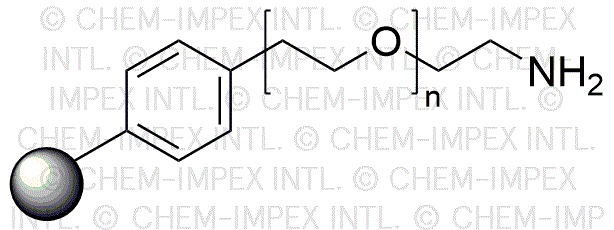TentaGel R NH2 Resin (0.18 - 0.2 mmol/g, 90 µm) is widely utilized in research focused on:
- Peptide Synthesis: This resin is ideal for solid-phase peptide synthesis, allowing researchers to create peptides with high purity and yield, essential for drug development and biochemical studies.
- Drug Discovery: The resin supports the synthesis of compound libraries, enabling pharmaceutical companies to screen for potential drug candidates efficiently.
- Bioconjugation: It can be used to attach biomolecules like proteins or antibodies to surfaces, which is crucial in developing diagnostic tools and therapeutic agents.
- Material Science: The resin is applied in creating functional materials, such as sensors or catalysts, due to its ability to facilitate the attachment of various functional groups.
- Research in Nanotechnology: Its properties make it suitable for fabricating nanostructures, which are important in electronics and materials engineering.
General Information
Properties
Safety and Regulations
Applications
TentaGel R NH2 Resin (0.18 - 0.2 mmol/g, 90 µm) is widely utilized in research focused on:
- Peptide Synthesis: This resin is ideal for solid-phase peptide synthesis, allowing researchers to create peptides with high purity and yield, essential for drug development and biochemical studies.
- Drug Discovery: The resin supports the synthesis of compound libraries, enabling pharmaceutical companies to screen for potential drug candidates efficiently.
- Bioconjugation: It can be used to attach biomolecules like proteins or antibodies to surfaces, which is crucial in developing diagnostic tools and therapeutic agents.
- Material Science: The resin is applied in creating functional materials, such as sensors or catalysts, due to its ability to facilitate the attachment of various functional groups.
- Research in Nanotechnology: Its properties make it suitable for fabricating nanostructures, which are important in electronics and materials engineering.
Documents
Safety Data Sheets (SDS)
The SDS provides comprehensive safety information on handling, storage, and disposal of the product.
Product Specification (PS)
The PS provides a comprehensive breakdown of the product’s properties, including chemical composition, physical state, purity, and storage requirements. It also details acceptable quality ranges and the product's intended applications.
Certificates of Analysis (COA)
Search for Certificates of Analysis (COA) by entering the products Lot Number. Lot and Batch Numbers can be found on a product’s label following the words ‘Lot’ or ‘Batch’.
Numéro de catalogue
Numéro de lot/série
Certificates Of Origin (COO)
This COO confirms the country where the product was manufactured, and also details the materials and components used in it and whether it is derived from natural, synthetic, or other specific sources. This certificate may be required for customs, trade, and regulatory compliance.
Numéro de catalogue
Numéro de lot/série
Safety Data Sheets (SDS)
The SDS provides comprehensive safety information on handling, storage, and disposal of the product.
DownloadProduct Specification (PS)
The PS provides a comprehensive breakdown of the product’s properties, including chemical composition, physical state, purity, and storage requirements. It also details acceptable quality ranges and the product's intended applications.
DownloadCertificates of Analysis (COA)
Search for Certificates of Analysis (COA) by entering the products Lot Number. Lot and Batch Numbers can be found on a product’s label following the words ‘Lot’ or ‘Batch’.
Numéro de catalogue
Numéro de lot/série
Certificates Of Origin (COO)
This COO confirms the country where the product was manufactured, and also details the materials and components used in it and whether it is derived from natural, synthetic, or other specific sources. This certificate may be required for customs, trade, and regulatory compliance.

